The long journey home
Mya Byrne’s new album, Rhinestone Tomboy, shows the artist at the peak of her powers, delivering 12 country songs with evocative melodies and poetic lyrics. Most of the album was written during the COVID pandemic and touches on heartache, love and the beauty of the California countryside.
“I was in Berkeley for the lockdown with my dear friend and fellow activist, Jade,” Byrne recalled. “We spent the days gardening, crying and trying not to go crazy. We were all scared, but the sun was out, there was no pollution, and the skies were clear. I was watching other friends suffer, but I was able to take in the great beauty of our environment. A lot of the songs are about this time, as well as the wildfires, how California has been abused by the people that run things and the social justice movement that was happening and continues to happen.”
Although she grew up in New Jersey, Byrne had a fondness for the Bay Area for as long as she could remember. “I had a picture of San Francisco on the wall of my childhood bedroom,” Byrne explained. “It was a painting of a hot air balloon day in the ’80s, when men still had mustaches. As I grew certain of my queerness and coming out, I was aware of the living gay history of the Bay Area. I wanted to be part of that. I lived in the Lobot Gallery and found myself in a lot of discussions about trans art. I also played bass in The Homobiles, with queercore legends Ed Varga and Lynn Breedlove.”
Cindy Emchy, leader of the Secret Emchy Society, had befriended Byrne and introduced her to the Bay Area’s queer country music scene. “Then, through my queercore connections, I became part of Lavender Country, with Patrick Haggarty, the granddaddy of the queer country scene,” Byrne said. “I was also putting my own solo career together at that time. I had one foot in the punk scene and one in the queer country scene. During the pandemic, I found my own artistic path and became the artist that I am today.“
Rhinestone Tomboy is Byrne’s second solo outing with a full band and the first she’s recorded in Nashville, her part-time home. She made demos of the songs on the album in San Francisco. But once she got to Nashville, she turned over control of the project to her friend and producer, Aaron Lee Tasjan.
“I dove into my roots as a country writer, let go of the reins and let Aaron be in charge,” Byrne noted. “Aaron picked the songs and we both chose the musicians. I was like, ‘Let’s see what happens when I follow Aaron’s vision.’ I tend to be very meticulous, so it was a joy to do it that way. Everyone on the album is a friend. Megan Coleman plays drums with Allison Russell; Ellen Angelico is a top session guitarist. It was a labor of love and a joy to make a record with a mostly queer cast of characters coming from a similar holistic place as me.
“We did it old school. Instead of sending out demos, I played the songs live for the musicians. They arranged everything on the spot, which was humbling,” Byrne continued. “I was proud of what my friends were able to pull out from my songs. They made them sing in a way I never thought possible. All the basic tracking was done live, with minimal overdubs.”
Everything on Rhinestone Tomboy sounds like a hit. Byrne dips into her lower register for “Please Call Me Darlin’”, an ardent love song. Ellen Angelico’s shimmering steel guitar supports twang heavy lead lines by Tasjan and Tommy Scifres’ traditional country bass line, as Byrne speaks encouraging words to a potential partner in a tone that would make Conway Twitty blush with pride.
The album’s title is a sly nod to one of Glen Campbell’s biggest hits. But she said it also has a historical context. “The traditional meaning of tomboy came out of the Victorian era,” Bryne explained. “Girls were encouraged to be outgoing and active for a long time. Tomboy wasn’t a negative term, so I think of it as an antidote to a certain kind of thinking. Trans women are often forced to adhere to a specific kind of femininity. As I look back at my childhood, I see I wasn’t much different from my mom, or many other women who were butch, but cis. It’s just who I am.”
Recent events inspired Byrne’s latest song, “Burn This Statehouse Down.” It’s a response to the anti-LGBTQ+ laws passed in many Southern states. The song was released shortly before Rhinestone Tomboy came out.
“I wrote it with my pal, Paisley Fields,” Byrne said. “It’s about the actions of these so-called lawmakers and how they’re destroying democracy. I learned how to show up and get things done while living in the Bay Area. [Tennessee Gov.] Bill Lee recently said, ‘Activists want to burn the statehouse down.’ I laughed, and thought, ‘Yeah, he’s heard my song.’ It’s had a massive positive response, and most people get it as a rallying cry to defend democracy.”












